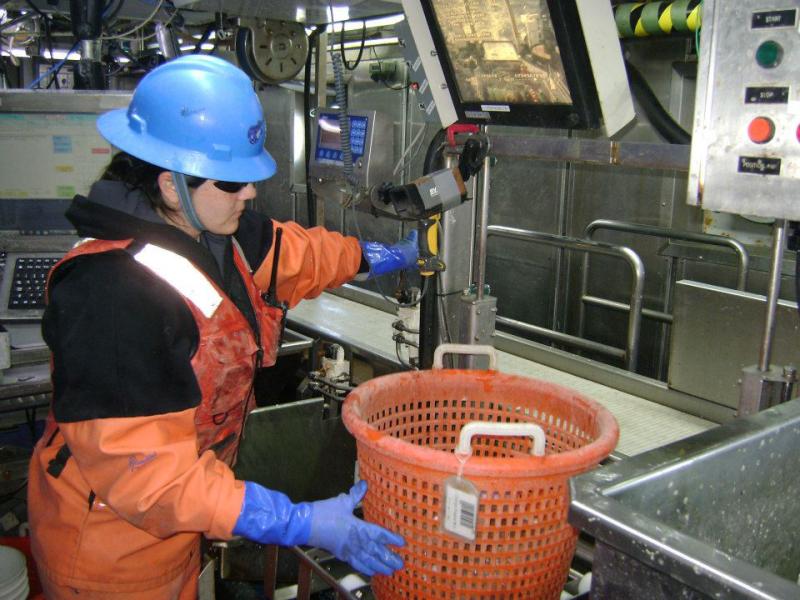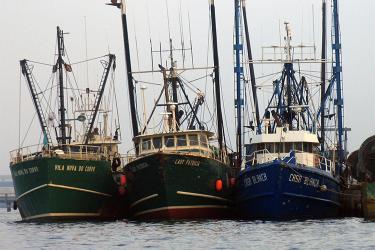Nicole Charriere is a biological science technician for the Ecosystems Surveys Branch. She spends about 130 days a year on government, chartered, and commercial fishing vessels, collecting important fisheries data to monitor the health and abundance of several Northeast fisheries stocks.
1. Can you tell us about your science journey, your career in science?
I owe the very beginning of my science journey to my mother. She is from Belize in Central America, which is part of the second largest barrier reef system in the world. When I was a little girl, she would take me there to visit family, and I would swim for hours with them in the warm, clear water and stare at all of the beautiful fish and corals. I realized that there was this whole other world full of amazing and interesting creatures that many people don’t see every day. Somehow, I just had to be a part of that world! I would read books about fish and ocean exploration whenever I could, and my parents took me to science museums and suggested that I learn how to scuba dive. The joy of being underwater and observing the same fish that I’d so often read about just seemed to cement everything in place, and I knew I wanted to spend the rest of my life learning about something that brought me such a sense of adventure, happiness, and excitement.
In college, I studied marine biology at the University of Rhode Island and completed a semester-long internship analyzing plankton samples for my deep-sea biology professor, Dr. Karen Wishner. After I graduated, she graciously invited me out on a 29-day research cruise on the former Woods Hole Oceanographic Institution research vessel Knorr, to help her and her amazing team collect more samples. While I didn’t necessarily fall in love with plankton, I did fall in love with the data collection process, as well as the time, effort, equipment, and teamwork that went into executing scientific sampling protocols. I also discovered that I didn’t want to get off the ship after almost a month at sea. This discovery made me look for a way to marry fish and at-sea life with the data collection process. Here at Northeast Fisheries Science Center, I’m incredibly lucky to find that!
2. Could you share an example of a hurdle or obstacle you experienced during your science journey and how did you overcome it?
The number of people that have told me “No” over the course of my career was quite frustrating and discouraging. I had to push aside all of the times people told me, “No, you can’t,” and surround myself with people who said, “Yes, you can.” I am fortunate enough to have supportive parents who nurtured my interests and passions when they saw them. I also had several teachers, friends, fellow scientists, and mentors who supported me both personally and professionally along the way. And in times when I thought that maybe no one could help me, I realized that sometimes the best person to encourage me and cheer me on was myself; we all have the power to be our own motivator.
3. What has been your biggest career and/or personal achievement?
I’ve been working alongside the Science Center since about 2009 as a contracted, sea-going biological technician. Over time, I realized that federal government positions in my line of work don’t open up very often. While I was disappointed about this, I accepted it because I enjoy my work so much, and love and believe very strongly in our Center's mission. Fortunately, a permanent position did open up and I was very recently hired as a federal biological technician, working with the same great Ecosystems Surveys Branch and many of the same amazing coworkers that were here when I first started as a contractor. I’m really proud of myself for putting in so many years of hard work and for persisting until there was a finally a place for me within NOAA Fisheries; it has absolutely been worth it.
4. What advice would you give young women about a career in science?
My first piece of advice – and I can’t stress this part enough – is to do what you love. You’ll spend a large portion of your life working, so make that time count by doing something that excites you and makes you enjoy going to work every day. Not only will you be happier, you’ll probably be more successful too. Then, try to be active within your field of interest by volunteering, networking, and talking with other people, especially women, who do something similar to what you might want to do. In many cases, getting your foot in the door is all about who you know. And once you finally get in that door, try to support your fellow women scientists when you can, and be prepared to work hard and persevere through any career frustrations; it’ll all be worth it when you land your dream job.
And my last piece of advice is one that applies not only to young women in science, but to young women everywhere: Own all your successes and don’t ever make yourself appear “less than” (less smart, less capable, less deserving, less strong, less outspoken, less of a leader, etc.) in order to make someone else happy or more comfortable. A lot of women, myself included, can sometimes battle with “impostor syndrome,” where they feel as if they have not earned their success - claiming luck, for example, while downplaying hard work and intelligence - and believing that they don’t belong among their highly successful peers. In those difficult and vulnerable moments, you have to learn how to silence self doubt; accept praise and remember all of your incredible strengths and capabilities that define who you are. Even if you are the only woman in the room, you are worthy of everything you achieve and of being celebrated for all the unique talents that you bring to the table - not only as a woman, but as you!



